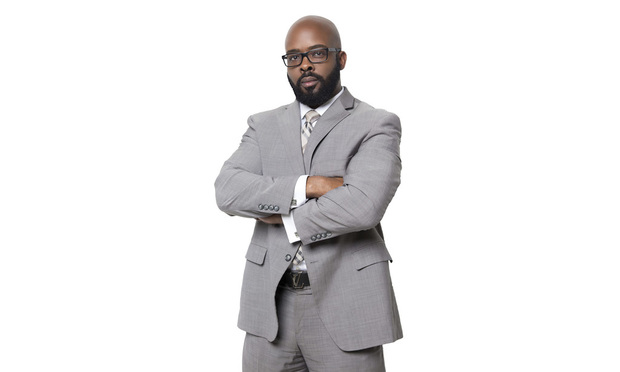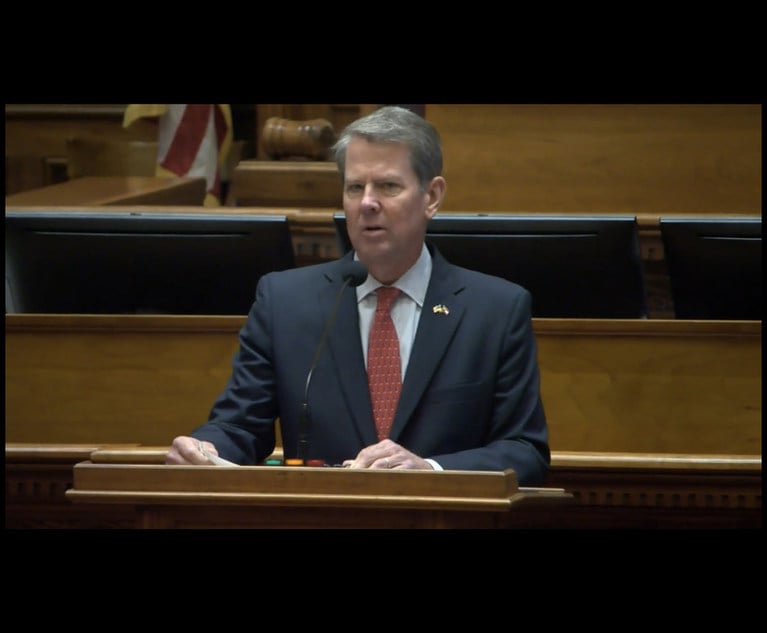Fired Salesman Wins $1M Verdict Against Ex-Boss
A then 24-year-old salesman alleged his boss fired him out of jealousy and then falsely accused him of burglary. The charges were dropped, but the arrest record kept him from getting a new job. He tried to settle for $10,000 before trial.
January 30, 2019 at 05:19 PM
4 minute read
 Reginald A. Greene, managing attorney, Greene Legal Group, Atlanta. (Courtesy photo).
Reginald A. Greene, managing attorney, Greene Legal Group, Atlanta. (Courtesy photo).
A salesman who sued his ex-boss for malicious prosecution and false arrest has won a $1 million judgment against his former employer.
Cobb County Superior Court Judge Reuben Green entered the judgment Monday following a trial that took a day and a half. The jury awarded $500,000 for general and special damages, $400,000 for punitive damages, and $100,000 for “peace, happiness and feelings damages.” The jury also added $3,291 for attorney fees and litigation expenses.
The winning lawyer, Reginald Greene of Greene Legal Group in Atlanta, said Wednesday he will be seeking interest, as well.
Greene said his client made an offer of settlement for $10,000. Instead, the employer offered $1,500.
“This case had dragged out so long, my client was actually willing to settle for $10,000 a year and a half ago,” Greene said. “Them trying to offer $1,500 seems like a slap in the face, now that you see the verdict.”
Greene represents Keenan Mays, who was 24 when the incident took place in January 2013. Mays alleged that his then-boss, Jamark Goodwin of Carly Ray Industries Inc., fired him in a fit of jealousy over a female employee and then filed a false police report. The complaint said Goodwin told Mays to come to the office of the glass repair business to pick up a final paycheck. When Mays appeared, Goodwin was not there. But he later told police that Mays had broken into the office.
Mays was arrested and jailed. Greene represented him in the criminal case, which was eventually dropped for lack of evidence. But the arrest on his record prevented Mays from being able to find another job, Greene said.
Romero Pearson of Pearson Law Group in Lawrenceville represented Goodwin and his company, which is now out of business. Pearson filed an answer to the lawsuit denying the charges without elaborating.
Pearson said Wednesday he will appeal the verdict but declined to comment further. Greene said Pearson cross-examined Mays and two other witnesses but did not present evidence or witnesses for the defense. And that wasn't the only factor that made for a fast trial. Greene said he opted for a six-person jury instead of 12, thinking that would make the trial move faster.
Greene said he had a clue the deliberations were going well for his client when the jury sent the judge a note asking if a plaintiffs verdict would help Mays clear up his record and get a new job. The judge answered that the jury was not to consider other factors outside the evidence presented.
In the end, Greene might have gotten some help from the #MeToo movement. The testimony and the complaint alleged that the boss openly used his position with the company to influence women—including a female employee that he encouraged to give police a false statement against Mays. The complaint alleged that the boss had become jealous of Mays as a potential rival for the attentions of women who worked in the business.
In his closing argument, Greene said he told the jury to “send a clear message to the Harvey Weinsteins and Bill Cosbys of the world.”
“I pulled out all the stops,” Greene said.
Greene's work is not done, however. Even if Goodwin's appeal fails, collection will be another challenge. Lacking deep pockets of an insurance company is not his favorite way to pursue a judgment, Greene said. That's why he sued the owner personally as well as the now-defunct company.
Said Greene, “We're going to aggressively pursue the guy.”
This content has been archived. It is available through our partners, LexisNexis® and Bloomberg Law.
To view this content, please continue to their sites.
Not a Lexis Subscriber?
Subscribe Now
Not a Bloomberg Law Subscriber?
Subscribe Now
NOT FOR REPRINT
© 2025 ALM Global, LLC, All Rights Reserved. Request academic re-use from www.copyright.com. All other uses, submit a request to [email protected]. For more information visit Asset & Logo Licensing.
You Might Like
View All
Panel to Decide if Governor Should Suspend Georgia Lawyer From Elected Post
4 minute read
Big Tech Is Cozying Up to President Trump. Here's Why Their Lawyers Are Cautiously Optimistic

Trending Stories
- 1Judges Split Over Whether Indigent Prisoners Bringing Suit Must Each Pay Filing Fee
- 2Law Firms Report Wide Growth, Successful Billing Rate Increases and Less Merger Interest
- 3CLOs Face Mounting Pressure as Risks Mushroom and Job Duties Expand
- 4X Faces Intense Scrutiny as EU Investigation Races to Conclusion & Looming Court Battle
- 5'Nation Is in Trouble': NY Lawmakers Advance Bill to Set Parameters for Shielding Juror IDs in Criminal Matters
Who Got The Work
J. Brugh Lower of Gibbons has entered an appearance for industrial equipment supplier Devco Corporation in a pending trademark infringement lawsuit. The suit, accusing the defendant of selling knock-off Graco products, was filed Dec. 18 in New Jersey District Court by Rivkin Radler on behalf of Graco Inc. and Graco Minnesota. The case, assigned to U.S. District Judge Zahid N. Quraishi, is 3:24-cv-11294, Graco Inc. et al v. Devco Corporation.
Who Got The Work
Rebecca Maller-Stein and Kent A. Yalowitz of Arnold & Porter Kaye Scholer have entered their appearances for Hanaco Venture Capital and its executives, Lior Prosor and David Frankel, in a pending securities lawsuit. The action, filed on Dec. 24 in New York Southern District Court by Zell, Aron & Co. on behalf of Goldeneye Advisors, accuses the defendants of negligently and fraudulently managing the plaintiff's $1 million investment. The case, assigned to U.S. District Judge Vernon S. Broderick, is 1:24-cv-09918, Goldeneye Advisors, LLC v. Hanaco Venture Capital, Ltd. et al.
Who Got The Work
Attorneys from A&O Shearman has stepped in as defense counsel for Toronto-Dominion Bank and other defendants in a pending securities class action. The suit, filed Dec. 11 in New York Southern District Court by Bleichmar Fonti & Auld, accuses the defendants of concealing the bank's 'pervasive' deficiencies in regards to its compliance with the Bank Secrecy Act and the quality of its anti-money laundering controls. The case, assigned to U.S. District Judge Arun Subramanian, is 1:24-cv-09445, Gonzalez v. The Toronto-Dominion Bank et al.
Who Got The Work
Crown Castle International, a Pennsylvania company providing shared communications infrastructure, has turned to Luke D. Wolf of Gordon Rees Scully Mansukhani to fend off a pending breach-of-contract lawsuit. The court action, filed Nov. 25 in Michigan Eastern District Court by Hooper Hathaway PC on behalf of The Town Residences LLC, accuses Crown Castle of failing to transfer approximately $30,000 in utility payments from T-Mobile in breach of a roof-top lease and assignment agreement. The case, assigned to U.S. District Judge Susan K. Declercq, is 2:24-cv-13131, The Town Residences LLC v. T-Mobile US, Inc. et al.
Who Got The Work
Wilfred P. Coronato and Daniel M. Schwartz of McCarter & English have stepped in as defense counsel to Electrolux Home Products Inc. in a pending product liability lawsuit. The court action, filed Nov. 26 in New York Eastern District Court by Poulos Lopiccolo PC and Nagel Rice LLP on behalf of David Stern, alleges that the defendant's refrigerators’ drawers and shelving repeatedly break and fall apart within months after purchase. The case, assigned to U.S. District Judge Joan M. Azrack, is 2:24-cv-08204, Stern v. Electrolux Home Products, Inc.
Featured Firms
Law Offices of Gary Martin Hays & Associates, P.C.
(470) 294-1674
Law Offices of Mark E. Salomone
(857) 444-6468
Smith & Hassler
(713) 739-1250







